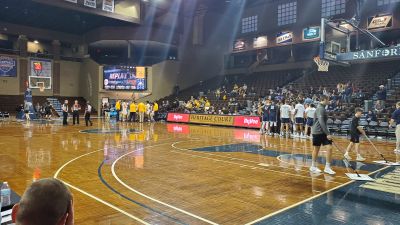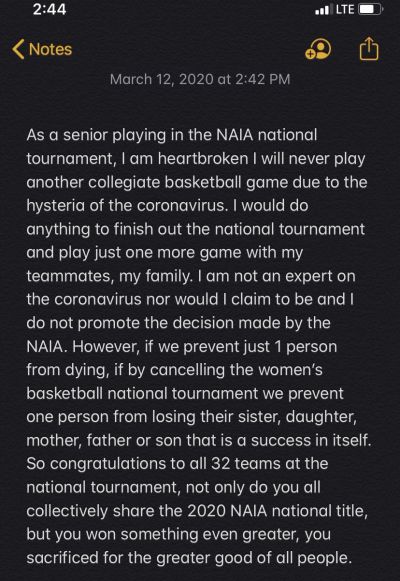
My head was in the sand in early March. There was only one focus: Concordia Athletics. We were coming off perhaps the most thrilling month of February ever for Bulldog sports. In recent weeks, GPAC championships had been captured by wrestling, men’s basketball, women’s basketball and women’s indoor track and field. Things were cooking.
On Thursday, March 5, I scrambled to gather my clothes and necessary SID tools in preparation for a trip south to Wichita, Kansas, for the NAIA Wrestling National Championships. Just in the nick of time, I rifled off a story on Tanner Farmer and his emergence as a GPAC champion and dominant NAIA wrestler after he had shifted from his career as an offensive lineman at the University of Nebraska. Leading into the weekend, there was a national curiosity regarding whether Farmer could win the heavyweight national title.
Simultaneously, Rachel Battershell and Jacob Cornelio would be chasing down indoor track and field national titles of their own in Brookings, South Dakota. Meanwhile, basketball was on the back burner this particular weekend. Collectively, the men’s and women’s basketball teams made March 3 a day to remember. The women knocked off rival Hastings while the men upset Dakota Wesleyan at the Corn Palace. Both teams had seized GPAC tournament titles and were now waiting to play in the national tournament the following week. Not only that, many spring sport teams were now embarking upon spring break trips.
If there was some sort of health crisis lying in wait, well that would have been news to me. There was too much coming up on the horizon to think about something else. You just can’t cancel March Madness, right? Seriously, that just doesn’t happen.
COVID-19 reality hits home
The reality of the coronavirus situation really didn’t hit me until Wednesday, March 11. Four days earlier, Farmer had fallen in the national championship match in ending a remarkable run. Battershell and Cornelio came through with NAIA titles and the women’s track team placed fourth in the nation. At the very same time, I had been keeping tabs on baseball, men’s golf, softball and tennis. On March 7, lefty pitcher Jason Munsch continued his abbreviated but spectacular spring with a school record 20-strikeout performance.
It seemed about the only thing that could derail this momentum was … a virus? I heard murmurs about the growing seriousness of the situation during that weekend in Wichita. Myself and Director of Athletics Devin Smith were present at the wrestling tournament. Associate AD Angela Muller went north to Brookings. My focus remained on the coverage of our teams, but I was made aware of conversations taking place between administrators. All scheduled events through March 11 went on as usual.
On that date (March 11), the top-ranked women’s basketball team cruised to a national tournament first-round win over Wilberforce of Ohio. It was the start of another hopeful lengthy stay in Sioux City. Unfortunately, there were some dispiriting revelations to come that day. Late on March 11, the NAIA announced that there would be fan restrictions moving forward for basketball tournaments. I sat in a hotel room that night along with Devin, Angela and our radio play-by-play voice Tyler Cavalli. We watched highlights of some of the last professional and collegiate sports we would see for some time, with the exception of the game the next day. Little did we know.
There was a strange feel to the day on March 12 when the Concordia men took the court at the Sanford Pentagon in Sioux Falls, South Dakota. As the game unfolded, basketball tournaments all over the country were being canceled in response to what was now being declared a global pandemic. The Bulldogs dropped a heartbreaker to fifth-ranked Ottawa. That result would be overshadowed. Even before the buzzer sounded, the NAIA had sent out an email. I read it during the final minute of a very tight contest. The outcome suddenly seemed of little consequence. I was stunned. All basketball tournaments were now canceled, effective immediately. Soon after the buzzer sounded, an eerie and somber tone prevailed inside the Sanford Pentagon.
Back in Sioux City, Drew Olson braced himself before letting his team know that it would not have the chance to defend its 2019 national title. I obviously wasn’t there, but felt the pain from miles away. Rather, I really didn’t know what they were feeling. I was mostly just shocked. Four days later, the NAIA announced the cancellation of the remainder of spring sports. Sports everywhere were suddenly sidelined. It was now a time for quarantine, obsession over media information and misinformation, guidelines and White House briefings. Dr. Anthony Fauci was suddenly getting more face time than any athlete.
On Monday, March 16, a teary-eyed Devin Smith addressed the athletic department – in person. Every additional meeting would be virtual for some time into the future. This news hurt Devin a lot. During this time, some of us would have to construct a new ‘why’ – at least when it comes to our professional lives. All of our hearts hurt for the student-athletes. Sports are about more than just the games or the events themselves. They are about people.
Now what?
The aftermath
Let’s face it. Life is not nearly as exciting in the absence of sports. Oh I get it, some people don’t care. I feel bad for them. During the week of March 16, we began looking for everything and anything to satisfy the hunger. When it comes to sports media, which I am closely tied to, this became a challenging time in terms of content creation. How do you stay relevant when no sports are being played?
The back half of March felt like a calendar year all by itself. It was totally understandable for one to feel afraid. Obviously many felt it. How else do you explain the panic buying of massive amounts of toilet paper? I never worried so much about that. I wanted to figure out how we could keep getting our brand out there.
In the aftermath of the announcement, I handled media requests for women’s basketball stars Grace Barry and Philly Lammers and eventual Major League Baseball signee Jason Munsch. Barry gained plenty of traction on Twitter with her emotional and thoughtful response to the abrupt end of her career. She expressed empathy for others – and it resonated. It’s people like that who make Concordia a special place.
It was difficult to be left with the unknowns. Would Barry and the Bulldogs have won back-to-back national titles? While possessing arguably the most dominant pitcher in the NAIA, could Head Coach Ryan Dupic’s baseball squad have nailed down its third GPAC title in four years? As for softball, could a team built around stars such as Hhana Haro, Tori Homolka, Camry Moore and Kylee Nixon have competed for a GPAC championship of its own? Would Rachel Battershell and women’s track have continued their roll?
Eight Bulldog Coaches Shows that spanned the months of April and May provided some therapeutic conversations for myself, Devin Smith and Tyler Cavalli. Many of our discussions centered upon the success achieved in February and March and the uncertainty the new circumstances brought about. We previewed fall schedules that were going to be shaken up in June. We now know that we will wait until at least September 5 before another Concordia sporting event takes place. By that point it will have been 176 days between Bulldog events.
Not that it’s been a completely uneventful period in American history. Quite the contrary. Not only have we found ways to manage through the pandemic, many of us have engaged in very different types of conversations since the murder of George Floyd on May 25. In response to the tragedy, African Americans have been empowered to speak out about racial inequality in the United States. As it relates to college athletics, college football players around the country have voiced their concerns. We may have to wait until the fall to understand exactly how this impacts us at Concordia. One thing is clear: we live in a fluid and rapidly changing world.
Keep telling the story
Since sports went dark, my goal has been to keep telling Concordia’s story. At cune.edu/athletics, we have featured several individuals while updating what our teams are doing in a time of physical isolation. I was honored to be awarded with the title of the top national feature story in the NAIA thanks to a piece that came from the heart, “The Days That Sports Stand Still.”
In recent months I’ve had the wonderful opportunity to interview or write about numerous alums, including Jennifer Davis, Erik DeHaven, Shawn Rodehorst, Michael Saalfeld and Glen Snodgrass, among others. I’ve detailed the top players at each jersey number during the GPAC era in the sports of men’s and women’s basketball and football. I’ve surveyed media to find out what they think about Concordia Athletics. I’ve written about classic sports moments during the GPAC era. I’ve also talked to current athletes to see how they are preparing for upcoming seasons. These discussions over the phone have honestly been uplifting for me personally.
Of course, there’s nothing wrong with taking a break. There are no 50, 60 or 70 hour weeks without sporting events. For those of us in the sports information profession, the workload went from complete craziness in early March to a very abrupt close to the 2019-20 athletics season. It means weekends off and a quiet campus that has been shut off from the public. In order to keep productivity up, I have continued to come into the office. I find it’s easier to avoid distraction as compared to being at home.
I’ve watched a lot more TV than usual, I bought “MLB: The Show” and my screen time has rocketed up to dangerous levels. I’ve read a few books lately and have tried to keep my mind occupied. Nothing real exciting though, really. I miss sports. I miss telling stories of actual sporting events, although there is always some story to tell. Everyone truly does have a story.
What next?
On June 25, I received a call from someone who has followed the Concordia football program (and many other college football programs). He asked what I was hearing in regards to the upcoming season. Is it going to happen? Will athletes be required to be tested? What precautions are in place? Sometimes the best answer really is: I don’t know. There still is so much we don’t know. What we do know is that it would be another immense heartbreaker if there are any more setbacks.
As many of our coaches talk about with their own athletes, you have to control what you can. Right now, Concordia has great people in place that are doing the best they can. Service to student-athletes is No. 1. From athletes that I’ve had the privilege to talk to, I can say that overwhelmingly they want to get back to action. I truly hope that can happen safely. Student-athletes in the area have been welcomed back inside of our facilities, with restrictions of course.
Some tough days could still be ahead but as of right now, we plan and hope to play ball this fall. Believe me, I’m ready to embrace the long hours again. God willing, there will be continued home domination, touchdowns, kills, goals, GPAC titles, NAIA national championship events, memories made, postgame singing of The Doxology and victories over Doane. I hope we can pick up where we left off. At Concordia, our coaches and staff can’t wait to see smiles on the faces of student-athletes once again.
